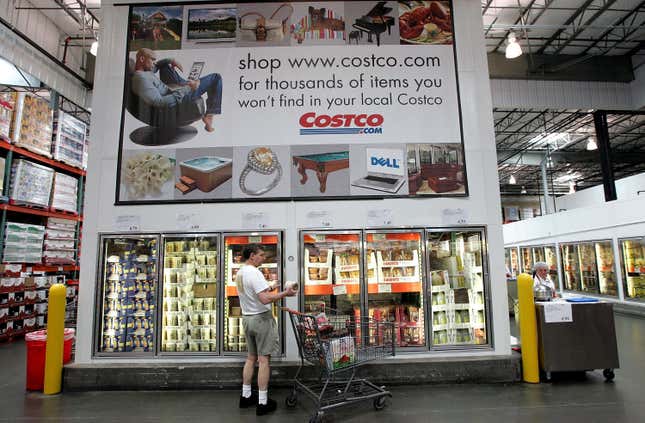In This Story
When Costco launched its Kirkland (COST) brand 30 years ago, it was a bold decision that set the company apart in a retail environment dominated by fragmented private label products.
Rather than offering a variety of store brands for different categories, Costco decided to consolidate hundreds of goods under the Kirkland name. The decision has paid off in a big way. Today, the Kirkland brand accounts for around $86 billion of Costco’s total $254 billion in annual revenue, according to the Wall Street Journal.
“One of the significant disciplines of our business is the limited selection,” Jim Sinegal, Costco’s cofounder, told the publication.
While most retailers stock tens of thousands of items, Costco’s approach is vastly different. Shoppers can expect to find around 4,000 items in-store, a stark contrast to the 140,000 items offered at other retailers like Walmart (WMT).
The pared-down approach is intentional, Sinegal explained. Costco’s shopping experience has been described as a “treasure hunt,” designed to make a big impression as customers walk in. “Everything presented at Costco is pretty big, hits you right in the face whenever you walk in there,” he said.
The decision to create a single private label brand, rather than multiple segmented labels, was a risk. But it allowed Costco to build Kirkland into a cohesive and recognizable brand that spans every product category. From groceries to electronics, to wine and gold, Costco has come a long way from its early days when it offered just hair care and vitamins. In some locations today, customers may even find luxury items like Porsches.

The name “Kirkland” itself is a reminder of Costco’s start. The company’s original headquarters were in Kirkland, Washington, and when Costco moved to nearby Issaquah, the name remained. “We didn’t feel that putting Costco on the private label was the right choice, because we were doing so much business with other suppliers and brands,” Sinegal explained.
As a result, Kirkland has become one of the most recognizable and successful private label brands in the U.S. Its success has not only fueled Costco’s growth, but has also reshaped the private label landscape. In many ways, Costco’s gamble on Kirkland has forced other retailers like Aldi, Walmart, and Target to rethink their approach to private labeling. It’s even inspired Walmart-owned Sam’s Club to double down on its private label, Member’s Mark. Today, these retailers all offer their own private labels, with many boasting competitive pricing and quality that rivals national names.
Costco remains an outlier in other areas as well. When it comes to Diversity, Equity, and Inclusion (DEI), Costco has remained steadfast in its commitment, even as retailers like Walmart and Target scale back on their efforts. Outside of its iconic warehouses, Costco operates more than 700 gas stations, which contributed to about 12% of the company’s sales in 2024. Additionally, in the ongoing debate over tariffs, Costco has followed Walmart’s lead by asking Chinese suppliers to absorb some the U.S. tariffs.